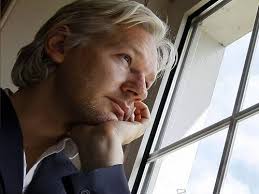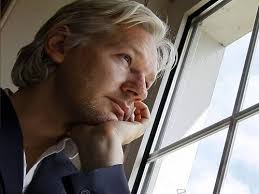
A United Nations panel examining an appeal by WikiLeaks founder Julian Assange will rule on Friday that his three-and-a-half-year stay in the Ecuadorian embassy in London amounts to 'unlawful detention', the BBC reported.
He was a political refugee whose rights had been infringed by being unable to take up asylum in Ecuador said Assange, a former computer hacker who has been holed up in the embassy since June 2012, told the U.N. Working Group on Arbitrary Detention.
While claiming that the Australian had voluntarily avoided arrest by jumping bail to flee to the embassy, Britain said it had never arbitrarily detained Assange.
Assange, who has been denying the allegations of rape, would be arrested if he leaves the embassy and then extradited to Sweden for questioning over allegations of rape in 2010, it said.
"Should the U.N. announce tomorrow that I have lost my case against the United Kingdom and Sweden, I shall exit the embassy at noon on Friday to accept arrest by British police as there is no meaningful prospect of further appeal," Assange said in a statement posted on the Wikileaks Twitter account.
"However, should I prevail and the state parties be found to have acted unlawfully, I expect the immediate return of my passport and the termination of further attempts to arrest me," he added.
Since he incensed the United States and its allies by using his WikiLeaks website to leak hundreds of thousands of secret U.S. diplomatic and military cables in 2010, disclosures that often embarrassed Washington, a decision in his favor would mark the latest twist in a tumultuous journey for Assange.
There are fears that were accepted by Assange himself that Sweden will extradite him to the United States, where he could be put on trial over WikiLeaks' publication of the classified military and diplomatic documents, one of the largest information leaks in U.S. history.
Assange shot to the news and the spotlight when WikiLeaks published classified U.S. military video showing a 2007 attack by Apache helicopters that killed a dozen people in Baghdad, including two Reuters news staff in 2010.
Details of the U.S.-led military campaign in Afghanistan was revealed in 90,000 secret documents later that year which was followed by internal reports that ran into 400,000 about U.S. military reports detailing operations in Iraq. More than 250,000 classified cables from U.S. embassies were then leaked by WikiLeaks and added more than almost three million more diplomatic cables dating back to 1973.
Assange argued that his time in the embassy constituted arbitrary detention while submitting his side to the U.N. working group, a body of outside experts. His fate is a test case for freedom of expression and Assange says he is the victim of a witch hunt directed by the United States.
Lack of access to sunlight or fresh air, adequate medical facilities, as well as legal and procedural insecurity was among the fundamental rights that he claimec he has been deprived of.
"We have been consistently clear that Mr Assange has never been arbitrarily detained by the UK but is, in fact, voluntarily avoiding lawful arrest by choosing to remain in the Ecuadorean embassy," a British government spokeswoman said.
"An allegation of rape is still outstanding and a European Arrest Warrant in place, so the UK continues to have a legal obligation to extradite Mr Assange to Sweden," she added.
(Source:www.reuters.com)
He was a political refugee whose rights had been infringed by being unable to take up asylum in Ecuador said Assange, a former computer hacker who has been holed up in the embassy since June 2012, told the U.N. Working Group on Arbitrary Detention.
While claiming that the Australian had voluntarily avoided arrest by jumping bail to flee to the embassy, Britain said it had never arbitrarily detained Assange.
Assange, who has been denying the allegations of rape, would be arrested if he leaves the embassy and then extradited to Sweden for questioning over allegations of rape in 2010, it said.
"Should the U.N. announce tomorrow that I have lost my case against the United Kingdom and Sweden, I shall exit the embassy at noon on Friday to accept arrest by British police as there is no meaningful prospect of further appeal," Assange said in a statement posted on the Wikileaks Twitter account.
"However, should I prevail and the state parties be found to have acted unlawfully, I expect the immediate return of my passport and the termination of further attempts to arrest me," he added.
Since he incensed the United States and its allies by using his WikiLeaks website to leak hundreds of thousands of secret U.S. diplomatic and military cables in 2010, disclosures that often embarrassed Washington, a decision in his favor would mark the latest twist in a tumultuous journey for Assange.
There are fears that were accepted by Assange himself that Sweden will extradite him to the United States, where he could be put on trial over WikiLeaks' publication of the classified military and diplomatic documents, one of the largest information leaks in U.S. history.
Assange shot to the news and the spotlight when WikiLeaks published classified U.S. military video showing a 2007 attack by Apache helicopters that killed a dozen people in Baghdad, including two Reuters news staff in 2010.
Details of the U.S.-led military campaign in Afghanistan was revealed in 90,000 secret documents later that year which was followed by internal reports that ran into 400,000 about U.S. military reports detailing operations in Iraq. More than 250,000 classified cables from U.S. embassies were then leaked by WikiLeaks and added more than almost three million more diplomatic cables dating back to 1973.
Assange argued that his time in the embassy constituted arbitrary detention while submitting his side to the U.N. working group, a body of outside experts. His fate is a test case for freedom of expression and Assange says he is the victim of a witch hunt directed by the United States.
Lack of access to sunlight or fresh air, adequate medical facilities, as well as legal and procedural insecurity was among the fundamental rights that he claimec he has been deprived of.
"We have been consistently clear that Mr Assange has never been arbitrarily detained by the UK but is, in fact, voluntarily avoiding lawful arrest by choosing to remain in the Ecuadorean embassy," a British government spokeswoman said.
"An allegation of rape is still outstanding and a European Arrest Warrant in place, so the UK continues to have a legal obligation to extradite Mr Assange to Sweden," she added.
(Source:www.reuters.com)





